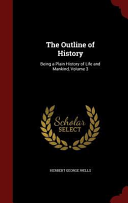Quotes from book
The Outline of History

The Outline of History, subtitled either "The Whole Story of Man" or "Being a Plain History of Life and Mankind", is a work by H. G. Wells chronicling the history of the world from the origin of the Earth to the First World War. It appeared in an illustrated version of 24 fortnightly installments beginning on 22 November 1919 and was published as a single volume in 1920. It sold more than two million copies, was translated into many languages, and had a considerable impact on the teaching of history in institutions of higher education. Wells modeled the

Source: The Outline of History (1920), Ch. 36
Context: From 1789 to late in 1791 the French Revolution was an orderly process, and from the summer of 1794 the Republic was an orderly and victorious state. The Terror was not the work of the whole country, but of the town mob which owed its existence and its savagery to the misrule, and social injustice of the ancient regime... More lives were wasted by the British generals alone on the opening day of what is known as the Somme offensive of July, 1916 than in the whole French Revolution from start to finish.

“All the miseries and discontents of life are due, he taught, to selfishness.”
Source: The Outline of History (1920), Ch. 25
Context: The Buddha Is Nearer to Us You see clearly a man, simple, devout, lonely, battling for light, a vivid human personality, not a myth. Beneath a mass of miraculous fable I feel that there also was a man. He too, gave a message to mankind universal in its character. Many of our best modern ideas are in closest harmony with it. All the miseries and discontents of life are due, he taught, to selfishness. Selfishness takes three forms — one, the desire to satisfy the senses; second, the craving for immortality; and the third the desire for prosperity and worldliness. Before a man can become serene he must cease to live for his senses or himself. Then he merges into a greater being. Buddha in a different language called men to self-forgetfulness five hundred years before Christ. In some ways he was near to us and our needs. Buddha was more lucid upon our individual importance in service than Christ, and less ambiguous upon the question of personal immortality.

“Human history becomes more and more a race between education and catastrophe…”
Source: The Outline of History (1920), Ch. 41
Context: Human history becomes more and more a race between education and catastrophe... Yet, clumsily or smoothly, the world, it seems, progresses and will progress.

Source: The Outline of History (1920), chapter no. 25.4 (Buddhism and Ashoka) page no 365-366
Context: Ashoka (264 to 227 B. C.), one of the great monarchs of history, whose dominions extended from Afghanistan to Madras... is the only military monarch on record who abandoned warfare] after [[victory. He had invaded Kalinga (255 B. C.), a country along the east coast of Madras, perhaps with some intention of completing the conquest of the tip of the Indian peninsula. The expedition was successful, but he was disgusted by what be saw of the cruelties and horrors of war. He declared, in certain inscriptions that still exist, that he would no longer seek conquest by war, but by religion, and the rest of his life was devoted to the spreading of Buddhism throughout the world. He seems to have ruled his vast empire in peace and with great ability. He was no mere religious fanatic. For eight and twenty years Asoka worked sanely for the real needs of men. Amidst the tens of thousands of names of monarchs that crowd the columns of history, their majesties and graciousnesses and serenities and royal highnesses and the like, the name of Asoka shines, and shines, almost alone, a star. From the Volga to Japan his name is still honoured. China, Tibet, and even India, though it has left his doctrine, preserve the tradition of his greatness. More living men cherish his memory to-day than have ever heard the names of Constantine or Charlemagne.

Source: The Outline of History (1920), chapter no. 25.4 (Buddhism and Ashoka) page no 365-366
Context: Ashoka (264 to 227 B. C.), one of the great monarchs of history, whose dominions extended from Afghanistan to Madras... is the only military monarch on record who abandoned warfare] after [[victory. He had invaded Kalinga (255 B. C.), a country along the east coast of Madras, perhaps with some intention of completing the conquest of the tip of the Indian peninsula. The expedition was successful, but he was disgusted by what be saw of the cruelties and horrors of war. He declared, in certain inscriptions that still exist, that he would no longer seek conquest by war, but by religion, and the rest of his life was devoted to the spreading of Buddhism throughout the world. He seems to have ruled his vast empire in peace and with great ability. He was no mere religious fanatic. For eight and twenty years Asoka worked sanely for the real needs of men. Amidst the tens of thousands of names of monarchs that crowd the columns of history, their majesties and graciousnesses and serenities and royal highnesses and the like, the name of Asoka shines, and shines, almost alone, a star. From the Volga to Japan his name is still honoured. China, Tibet, and even India, though it has left his doctrine, preserve the tradition of his greatness. More living men cherish his memory to-day than have ever heard the names of Constantine or Charlemagne.